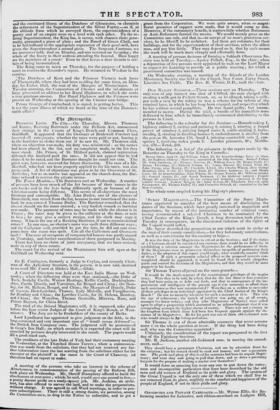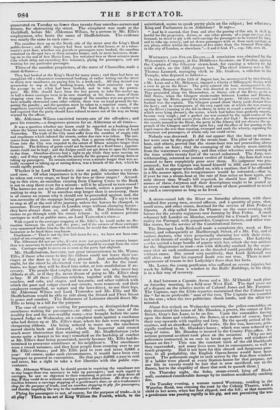OMNIBUSES AND PRIVATE CARRIAGES.—Mr. Wynne Ellis, the Re- forming member
for Leicester, and ribbon-merchant on Ludgate Ihll,
prosecuted on Tuesday no fewer than twenty-four omnibus-owners and drivers, for obstructing the street. The complaint was made at the Guildhall, before Mr. Alderman Wilson, by a person in Mr. Ellis's • employment, who bears the name of Shuffiebottom. The evidence
• was nearly the same in each case—
The omnibus drew up on the North side of the street near the King's Head public-house; and, after inquiry had been made at that house, or at a tobac- conist's next door, whether any parcels or passengers were booked, the omnibus remained on the spot two or three minutes longer, and, in most instances, draw- ing on to the end of Ave Maria Lane, has remained two or three minutes more (the whole delay not exceeding five minutes), plying for passengers, and not waiting for any particular passenger.
• Three of the omnibus proprietors, of the name of Chancellor, made a stout defence—
They had booked at the King's Head for many years ; and there had been no complaint till a tobacconist commenced booking, or rather letting out the street to thirty new omnibuses, on paying him is. a week each. All they desired was permission to stop at their booking-house, while their conductor ran up the passage to see what had been booked, and to take up the passen- gen. Mr. Ellis should have been the last person to take this matter up, as half a dozen carriages were to be seen standing at his doors, some of them stopping even two hours. If the stoppage of the omnibus was not proved to
have actually obstructed some other vehicle' there was no legal ground for im- posing the penalty ; and the question must be taken to a superior court, if the magistrate convicted without such proof. The Lord Mayor in a similar case had required that the party should have refused to move out of the way on being warned by the officer.
Mr. Alderman Wilson convicted twenty-one of the offenders ; and gave his reasons,—a dangerous process for an Alderman at all times— It was a question whether any house could be regarded as a booking-house where the horses were not taken from the vehicle. That was the view of Lord
Tenterden. The trade of the City must suffer from the number of empty cabs and omnibuses which infested the streets, unless due care was taken. The nui- sances from these causes were now such, that a person riding from Charing Cross into the City was impeded to the extent of fifteen minutes longer than formerly. The delivery of goods could not be insured at a fixed hour; appoint- ments could not be kept ; and the Judges could not get down to open the Courts in due time. Omnibus-drivers had a right to ply while they were moving on only; and if they stopped, it should be merely for the purpose of setting down or taking up passengers. To remain stationary even a minute longer than was ac- tually occupied in taking up or setting down, was a breach of the Act, which he would rigidly punish.
Whether it be Lord Tentenden's view or not, this seems a very ab- surd view. Of what importance is it to the public whether the horses be taken out every stage, or kept in for two or three stages ? Accord- ing to this view_, an omnibus running from Charing Cross to the Bank is not to stop there even for a minute : will it be allowed to turn round? The horses are not to be allowed to draw breath, unless a passenger be waiting to step in. If an omnibus stop longer than is necessary, there is of course no reason why it should not be proceeded against, and, the non-necessity of the stoppage being proved, punished. To say it is not to stop at all at the end of its journey, unless the horses be changed, is nonsense. Every short stage in London stops without changing horses : they have always done so, and always will. But Alderman Wilson means to go through with his street reform : he will remove private carriages as well as public ones, on Lord Tenterden's view—
With regard to the carriages stopping at Mr. Ellis's, he could make no dis- tinction between the rich and the poor; aud if the owners of those carriages were summoned before him for the obstruction, be would tine them with as little hesitation as he fined these coachmen.
Coachman—" That is not the law laid down for us; we have not been con- victed of interrupting any one."
The Alderman did not see why, if carts were not permitted to remain longer than was necessary to load and unload, carriages should be exempt from the same rule. Carriages ought to move on as soon as the party had alighted.
Mr. Shuffiebottom, however, saw great inconvenience to Mr. Wynne Ellis, if those who came to buy his ribbons could not leave their car- riages at the door as long as they pleased. And undoubtedly they
• ought, let the street be obstructed ever so much. As for the omni- buses, we hope they will be fined into order, or into annihilation if ne- cessary. The people that employ them are a low set, who never buy ribbons at all, or if they do, never dream of going to Mr. Ellis's shop to buy. If all these villanous vehicles, together with the hackney- coaches, and cabs, and stages, and tax-carts, and other rubbish with which the poor and vulgar crowd our streets, were removed, and their employers compelled, as nature and the laws direct, to :use their legs, Mr. Alderman Wilson mid Lord Tenterden and Mr. Ellis and Mr. Shuffiebottom would be able to ride along the Strand and Meet Street in peace and comfort. The Reformers of Leicester should direct Mr. Ellis to bring in a bill for the purpose.
The case of carriages waiting for passengers, as distinguished from -omnibuses waiting for passengers—in other words, the case of the wealthy few and the non-wealthy many—was brought before the same learned Judge on Wednesday, on a complaint made against a coachman who bad drawn up at Mr. Ellis's door, where his fare were engaged in cheapening ribbons. On being ordered to move on, the coachman moved slowly back and forward ; which the Inspector said created much more obstruction than standing still. Mr. Shuffiebottom (who seems quite a lawyer in his way) remarked on the hardship of coaches at Mr. Ellis's door being prosecuted, merely because Mr. Ellis had de- termined to prosecute omnibuses at his neighbour's. The omnibuses were a recent nuisance, and they kept people from crossing over to see Mr. Ellis's ribbons; and Mr. Ellis paid in rent and taxes 3,000/. a year! Of course, under such circumstances, it would have been very Improper to proceed to extremities. He that pays 3,000/. a year in rent and taxes, has a right to take a few liberties with the public con- venience.
• Mr. Alderman Wilson said, he should persist in requiring the omnibuses not to stay longer than was necessary to take up passengers ; and with regard to carriages he saw no objection to their remaining at private or shop doors all day, N they could do so without causing a positive obstruction. He drew a dis- tinction between a carriage stopping at a gentleman's door, or at a tradesman's shop for the purpose of trade, and an omnibus stopping to ply for passengers, and thereby impeding the way to the tradesmen's shops. Plying for passengers is not, of course, for the purpose of trade—it is all play! There is an act of King William the Fourth, which, to the uninitiated, seems to speak pretty plain oft the subject; but what ard a King and Parliament to an Alderman? It says- " And be it enacted, that from and after the passing of this act, it shall he lawful for the proprietor, driver, or any other person, of a stage-cal riage duly licensed, to stand or ply with such carriage for passengers to be carried fur hire, and to take up, convey, and set down passengers with or from such carriage at any place, either within the distance of five miles from the General Post-office in the city of London, or elsewhere."-2 and 3 Gul. IV., cap. 126, sect. 31.



























 Previous page
Previous page